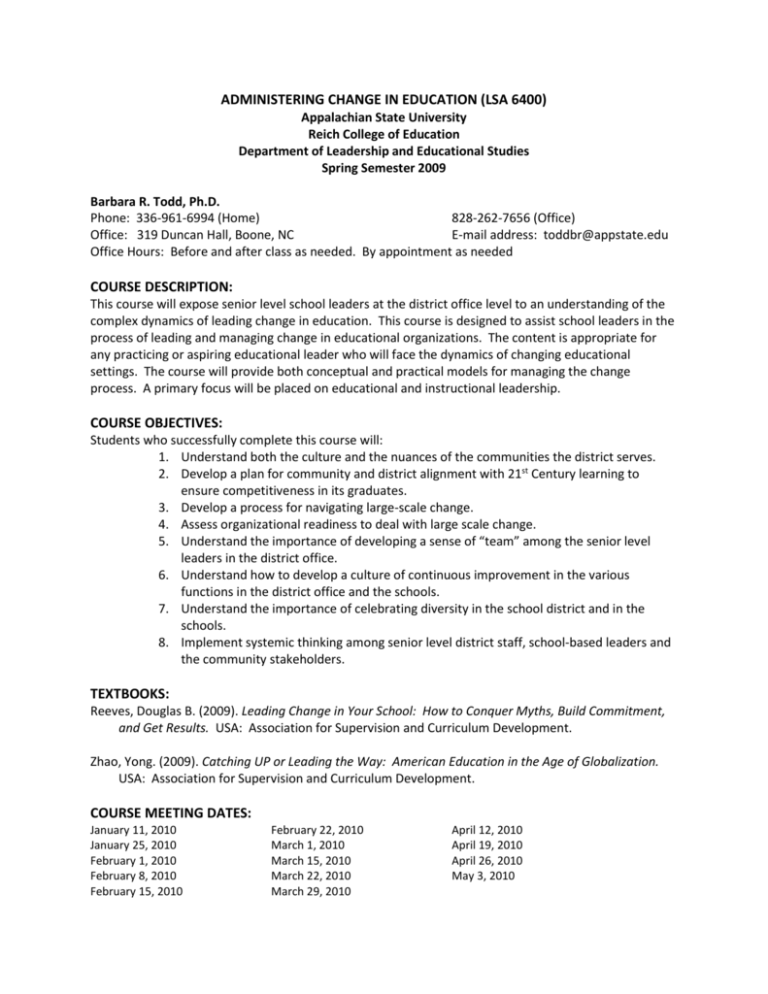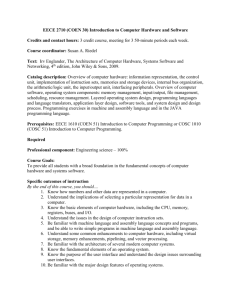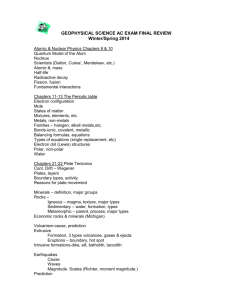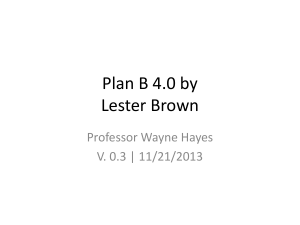LSA6400376101 - Syllabi - Appalachian State University
advertisement

ADMINISTERING CHANGE IN EDUCATION (LSA 6400) Appalachian State University Reich College of Education Department of Leadership and Educational Studies Spring Semester 2009 Barbara R. Todd, Ph.D. Phone: 336-961-6994 (Home) 828-262-7656 (Office) Office: 319 Duncan Hall, Boone, NC E-mail address: toddbr@appstate.edu Office Hours: Before and after class as needed. By appointment as needed COURSE DESCRIPTION: This course will expose senior level school leaders at the district office level to an understanding of the complex dynamics of leading change in education. This course is designed to assist school leaders in the process of leading and managing change in educational organizations. The content is appropriate for any practicing or aspiring educational leader who will face the dynamics of changing educational settings. The course will provide both conceptual and practical models for managing the change process. A primary focus will be placed on educational and instructional leadership. COURSE OBJECTIVES: Students who successfully complete this course will: 1. Understand both the culture and the nuances of the communities the district serves. 2. Develop a plan for community and district alignment with 21st Century learning to ensure competitiveness in its graduates. 3. Develop a process for navigating large-scale change. 4. Assess organizational readiness to deal with large scale change. 5. Understand the importance of developing a sense of “team” among the senior level leaders in the district office. 6. Understand how to develop a culture of continuous improvement in the various functions in the district office and the schools. 7. Understand the importance of celebrating diversity in the school district and in the schools. 8. Implement systemic thinking among senior level district staff, school-based leaders and the community stakeholders. TEXTBOOKS: Reeves, Douglas B. (2009). Leading Change in Your School: How to Conquer Myths, Build Commitment, and Get Results. USA: Association for Supervision and Curriculum Development. Zhao, Yong. (2009). Catching UP or Leading the Way: American Education in the Age of Globalization. USA: Association for Supervision and Curriculum Development. COURSE MEETING DATES: January 11, 2010 January 25, 2010 February 1, 2010 February 8, 2010 February 15, 2010 February 22, 2010 March 1, 2010 March 15, 2010 March 22, 2010 March 29, 2010 April 12, 2010 April 19, 2010 April 26, 2010 May 3, 2010 ACADEMIC INTEGRITY CODE: As a community of learners at Appalachian State University, we must create an atmosphere of honesty, fairness, and responsibility, without which we cannot earn the trust and respect of each other. Furthermore, we recognize that academic dishonesty detracts from the value of an Appalachian degree. Therefore, we shall not tolerate lying, cheating, or stealing in any form and will oppose any instance of academic dishonesty. This course will follow the provisions of the Academic Integrity Code, which can be found on the Office of Student Conduct Web Site: www.studentconduct.appstate.edu. ACCOMMODATIONS FOR STUDENTS WITH DISABILITIES: Appalachian State University is committed to making reasonable accommodations for individuals with documented qualifying disabilities in accordance with the Americans with Disabilities Act of 1990, and Section 504 of the Rehabilitation Act of 1973. Those seeking accommodations based on a substantially limiting disability must contact and register with The Office of Disability Services (ODS) at http://www.ods.appstate.edu/ or 828-262-3056. Once registration is complete, individuals will meet with ODS staff to discuss eligibility and appropriate accommodations. RELEVANT NORTH CAROLINA SUPERINTENDENT STANDARDS: Standard 1: Strategic Leadership – Challenges the status quo by leading change Considers new ways to accomplish tasks Driving force behind major initiatives that help students acquire 21st century skills Standard 2: Instructional Leadership – Identifies, implements and monitors use of 21st century instructional tools and best practices for meeting diverse student needs Challenges staff to define knowledge, skills and concepts needed for work or college for the 21st century Provides professional development for school principals in the area of instructional leadership Standard 3: Cultural Leadership – Builds community understanding of what is required to ensure that every public school student graduates from high school, ready for work or college Acknowledges failures and celebrates accomplishments of the district Creates an environment where diversity is valued and promoted Standard 4: Human Resource Leadership – Models the importance of continued adult learning by engaging in activities to develop professional knowledge and skill Provides for results-oriented professional development aligned with 21st century curricular, instructional and assessment needs, connected to district improvement goals and based on staff needs Standard 5: Managerial Leadership – Assesses and reassesses programs and resource allocation and use for relevancy and impact as the organization changes Standard 6: External Development Leadership – Develops collaborative partnerships with the community to support the 21st Century learning priorities of the district Standard 7: Micro-political Leadership – Prepares and recommends district policies to improve student learning and district performance with local, state and federal requirements ASSIGNMENTS 1. 2. 3. 4. 5. 6. Identify a problem in your school district that involves the need to change and would help student learning to improve. Research the problem and develop a plan for assisting your school district in making the change that is needed. Cite the sources you used in your research. (Due February 22, 2010.) Each of you will be expected to share your problem and the plan you’ve developed during the class. In today’s world, the focus on improving the education for students is a daily focus. Develop a plan for your school district that helps all faculty members to identify and plan for the learning of all students based on continuous improvement. Identify the issues that keep faculty members from embracing change and continuous improvement. As part of your overall plan, develop ways that will encourage resistant faculty members to make changes in instruction that are needed in their classrooms. Make this plan one for staff development that could be used by your faculty to change the way they are doing something to meet the educational needs of more of the children in your school. Put in the activities that you would include as well as any reading material you want the faculty to read. (Due March 15, 2010.) Interview an educator (preferably an administrator) with over 25 years experience in education who works in your school district and has worked there for at least 10 years. Have that educator identify the changes that have occurred during their work experience. Discuss the changes in the population that you are currently teaching. Also, have the educator to prioritize the most effective changes that have been made and why he/she believes those changes were effective. Write a paper regarding the information that you learned from this educator. Also, think about education for the next 10 years and develop a plan to promote change among the various stakeholders to provide a strong educational program for all groups of the community. This plan should include staff development activities. (Due February 8, 2010.) Develop a comprehensive plan to successfully assimilate a growing ethnic group in your school system and community. In this plan, give a narrative that explains what needs to be done for this group to better learn what they need to learn. Also, give a brief history in narrative form of the change in your school culture and the increase in the ethnic group that you have selected for your plan. Identify what caused the changes in your school culture over the years, if possible. (Due April 12, 2010.) Research school facility studies and recommendations regarding facilities for education in the 21st century. After you have identified the recommendations for space, do a space audit of your school system’s facilities. Identify the largest need and develop a feasible plan to attain that need. (Due April 26, 2010.) Completion of a paper and a presentation on a topic assigned. Dates will vary based on topic. COURSE EXPECTATIONS 1. Class attendance: Students are expected to be in class on time. Absences will be made up by completing an extra assignment regarding the topic being discussed on the date of the absence. Class attendance and participation is critical. Punctuality shows the value a person places on something, therefore habitual lateness indicates disinterest in completing this class. Students are expected to come prepared for class, actively participate and contribute to class discussions. Assignments should be submitted on time. 2. Written assignments: Any papers are to be written following the APA manual (5th edition). All work will be typed in Times New Roman, and in 12-point font. Plans may follow the type format that your school system uses for the various plans that are developed. Narrative pages should meet the same font and type as your papers. 3. Inclement Weather. Please check the website of the location (UNC School of the Arts) where we meet. If that location cancels class, our class will be cancelled. When a class is canceled due to inclement weather, an assignment will be given online through AsULearn. Complete that assignment during that week and respond to the AsULearn site or upload your assignment to an e-mail to me or to the AsULearn site. Also, check the Extension and Distance website (www.extdl.appstate.edu) for announcements. If I have a personal emergency and I must cancel class, I’ll notify you by phone or e-mail. Please fill out an information sheet so I can be sure to contact you. I will most likely ask some of you to assist me with the notifications. At present, I have not had to cancel but one class over the past three years and that was cancelled by the university where we met due to inclement weather. 4. Cell phones and pagers: Please put them in vibrate mode or turn them off to minimize class interruption. SUPPLEMENTAL RESOURCES Fullan, Michael. (2007). The New Meaning of Educational Change. 4th edition. New York: Teachers College Press. Johnson, Spencer. (1998). Who Moved My Cheese? New York: G. P. Putnam’s Sons. Wagner, Tony & Kegan, Robert. (2006). Change Leadership: A Practical Guide to Transforming Our Schools. California: Jossey-Bass. CLASS CALENDAR January 11, 2010 Introductions Review of EDS Program of Studies Review of Syllabus Review of Superintendent Standards, Competencies, Etc. Brief History of Educational Reform Issues Sign up for group presentations Assignment for January 25th: Read chapters 1 & 2 in Catching Up or Leading the Way for next class. Answer questions at the end of today’s power point. January 25, 2010 Discuss chapters 1 & 2 and the questions that went with those chapters. Who Moved My Cheese? By Spencer Johnson What lessons can we as educational leaders learn from this book? Chapters 3 & 4 in Yong Zhao book. February 1, 2010 Group presentation on The Challenges: Globalization & Technology Chapters 5 & 6 in Yong Zhao book. Include information from other sources as well in your presentation. February 8, 2010 Creating Conditions for Change. Chapters 1-5 in Leading Change in Your School by Douglas B. Reeves. Students will share the information they gained from their interview of an experienced educator for assignment 3. February 15, 2010 Group presentation on Planning Change. Chapters 6-9 in Reeves book. Include information from other sources as well as your thoughts about Reeves’ ideas. February 22, 2010 Group presentation on Implementing Change. Chapters 10-13 in Reeves book. Again, include information from other sources as well as your thoughts about the author’s ideas. Students share brief presentation on the problem and plan they chose for assignment 1. March 1, 2010 Group presentation on Sustaining Change. Chapters 14-Epilogue in Reeves book. Include in your presentation information on how to implement change one person at a time. March 15, 2010 Group Presentation on Three Cups of Tea by Greg Mortenson & David Oliver Relin. In this presentation, give a summary of the book. Then, elaborate how this book advances change. Also, include a focus on how this one individual is changing the world one school at a time. What can you as a school administrator learn from this man’s philosophy? Students share the plan they developed to help teachers facilitate learning for all from assignment 2. March 22, 2010 Group Presentation on Stones into Schools by Greg Mortenson. In this presentation, give a summary of the book. Focus on the community of people who worked to establish the schools. Were they the people you would expect to be interested in girls’ education? What can we learn from this book regarding resources in our own community that we may not take advantage of? What are some things that you can do to get more of your community involved in educating your students? March 29, 2010 The 4 C’s – competency, conditions, culture and context. An approach to thinking systemically about the challenges and goals of change in schools and districts. April 12, 2010 Read Chapters 7, & 8 of Zhao’s book. What is critical knowledge for the future? How does North Carolina’s 21st Century Skills match what Zhao feel’s is critical knowledge? How can you as educators work to make sure students in North Carolina are competitive with students in other states and other countries? Students will share the comprehensive plan they developed for assignment 4 regarding a growing ethnic group in your school. April 19, 2010 Dealing with change resistance/conflict resolution strategies. View movie: Lean on Me. Look for the methods this principal used and determine more effective methods of forcing change in today’s world. April 26, 2010 View the movie: Something the Lord Made. As you view this movie, look for the way the two main characters defied the rules of their time and worked to change society for the better. How can you take this information and help you become a better administrator? Students will share the information they learned as they studied their facilities and discuss the needs and the problems in meeting those needs for assignment 5. May 3, 2010 The importance of developing a sense of “team” among the senior level leaders in the district office and the schools. Final exam due. The final exam will be a take home exam.







